Preview The Orchid Show: Mr. Flower Fantastic's Concrete Jungle
Get a sneak peek of the New York Botanical Garden's exquisite new exhibition!


When craving authentic Chinese food, tourists and New York residents alike often flock to Manhattan’s Chinatown, a primarily Cantonese-speaking enclave dating back to the mid-1800s. Since then, Manhattan Chinatown has maintained much of its history, with some shops and restaurants like Nom Wah Tea Parlor along Doyers Street dating back nearly 100 years. Yet due to high rent and gentrification, many Chinatown residents and recent immigrants moved to Flushing, Queens and Sunset Park, Brooklyn, Chinatowns which are often considered more diverse and authentic than Manhattan’s Chinatown.
Yet, what most people don’t know is that New York houses many more obscure mini Chinatowns across Manhattan, Brooklyn, Queens, and even Nassau County. These areas have developed significantly fast as Chinese immigration increases year by year. Although many of these areas are not strictly Chinatowns since many other cultures also reside in these areas, they are definitely worth visiting and exploring each one’s food and culture, especially after facing over a year of economic hardship during the pandemic.
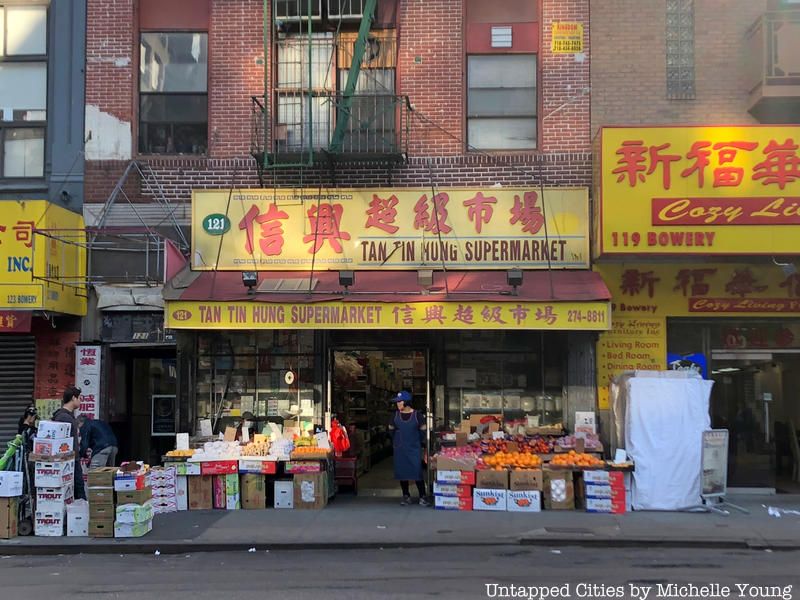
Manhattan’s Chinatown, dating back to the late 1800s, is a tightly-packed yet expansive Chinatown that mixes both traditional Chinese fare with more contemporary and experimental options. One of the most diverse Chinatowns in the United States, Manhattan Chinatown offers food lovers with some of the most authentic and delicious eats anywhere in the city.
Chinatown is so packed with restaurants that it may be difficult to find the best ones, but for a true street food experience, Wah Fung No 1 Fast Food offers a very small and cheap menu consisting of roast BBQ pork, duck, chicken, and fatty pig, all served over rice with cabbage. The very unassuming Fried Dumpling prides itself on its simple yet delicious fried pork dumplings as well as juicy fried pork buns and tangy hot and sour soup. Similarly, China North Dumpling offers chive and pork fried and steamed dumplings and well as sesame pancake and noodles with minced pork. Also popular for street food is Yi Ji Shi Mo Noodle Corp, which specializes in steamed rice rolls accompanied by options like coriander and scallion, curry fish ball, and dried shrimp.
Manhattan Chinatown is filled with dim sum places that feature carts filled with hundreds of steaming hot dim sum options like shrimp dumplings, steamed buns, rice rolls, and chicken feet. Popular options include Golden Unicorn, and Dim Sum Go Go, but also try Sunshine Seafood Restaurant and Downtown Yummy for authentic Cantonese dim sum. Legendary dim sum spot Jing Fong, which closed its expansive dining room earlier this year, will reopen in another space in Chinatown and is currently operating an Upper West Side location as well.
For a taste of Southeast China, Kong Sihk Tong offers a more modern take on Hong Kong cuisine with options like duck egg with jumbo shrimp, baked fried rice with pork chop, and satay beef. The very small House Special restaurant offers an abundance of Cantonese seafood like salt and pepper prawns, scallops in garlic sauce, and buffalo fish with ginger. A very casual spot, S Wan Cafe offers a rather Americanized Hong Kong-style menu with omelettes, macaroni with spam, and pork chop sandwiches.
Also prominent in Manhattan Chinatown are Taiwanese options like May Wah Fast Food, specializing in crispy pork chop, noodle soups, and fried rice cake. Taiwan Bear House takes a more contemporary approach to Taiwanese classics with options like pork chop and night market crispy chicken bento boxes.
For a sweet end to the trip, stop by Kam Boat Bakery, which features many traditional pastries like dried pork bun, pineapple bun, and gooey sesame balls, in addition to rice rolls and baked chicken. One of the most popular in the area, Kam Hing Coffee Shop features fluffy sponge cake and congee. For some sugary bubble tea, Hui Tea, Tiger Sugar, and Macao Imperial Tea will do the trick.
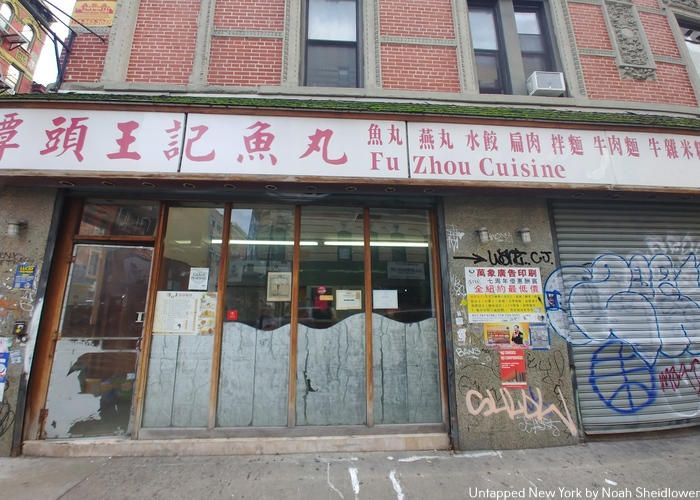
Although often grouped within Manhattan Chinatown, Little Fuzhou on the Lower East Side began in the 1980s when immigrants from cities like Fuqing and Changle in southeast China settled on East Broadway and Eldridge Street. Although the area has been declining due to gentrification and mass evictions, Little Fuzhou still remains as a unified community with Fuzhounese restaurants, stores, churches, and community centers.
Perhaps the staple of Fuzhounese cuisine in Manhattan, Shu Jiao Fu Zhou restaurant offers diners with a taste of this light, non-spicy cuisine. This unassuming restaurant, with rather dated and minimal decor and only a handful of tables, offers only 14 items on the menu including their pork and chive dumplings with translucent skin and juicy filling. Their wheat noodles with peanut butter sauce and beef tripe noodle soup are popular as well.
Other popular Fuzhounese eateries include Wei Zhong Wei, a tiny eatery in East Broadway Mall known for their steamed buns, sweet potato congee, and mei fun with duck or clams. Right down the road is Shui Mei Cafe, known for their noodle soups with lamb and fish balls. Additional places like Change Le Xin Fan Zhuang on Eldridge Street serve Fuzhou seafood delicacies like crab and abalone.
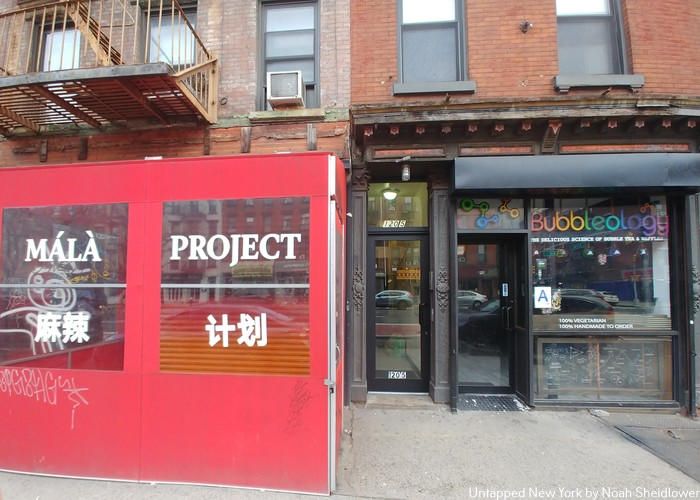
The East Village, about half a mile north of Little Fuzhou, has developed into a very modern and diverse Chinese enclave, featuring restaurants fusing traditional Chinese recipes with trendy and creative interpretations. The East Village, with an abundance of Japanese, Eastern European, and Latin American eateries, has seen a recent growth in Chinese and Taiwanese eateries just a few blocks from NYU, making it one of the city’s newest Chinatowns.
Szechuan Mountain House, with a location in Flushing, specializes in Sichuan cuisine, notorious for its extreme spice and numbing quality called “Má-La.” Popular dishes here include fish in chili oil, mapo tofu, braised frog, and pork belly. MáLà Project specializes in dry pot, in which diners choose meats and vegetables prepared with dry chili.
Dian Kitchen offers diners with a taste of Yunnan, a region whose cuisine is rarely seen in New York City. The menu includes Yunnan’s signature rice noodles called mixian, prepared either hot or cold with proteins like minced pork or tofu. Little Tong Noodle Shop also pays homage to Yunnan with dishes like Grandma chicken mixian and Garlicky Tingling mixian.
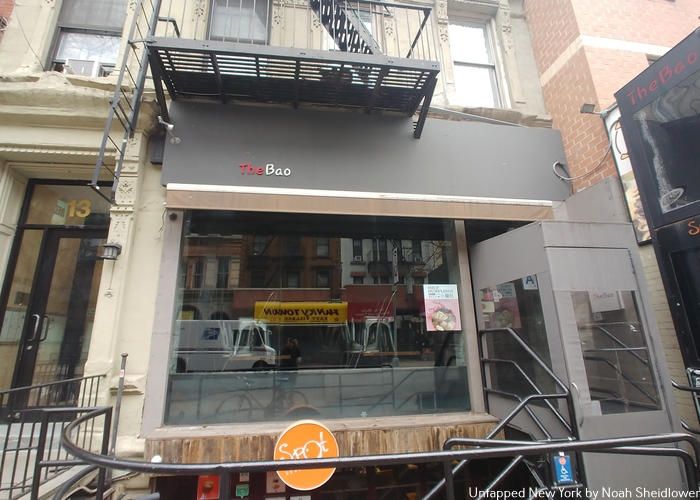
Other restaurants like Spicy Moon offer more contemporary twists to Chinese classics; Spicy Moon recreates Sichuan specialties using 100% vegan recipes like three cup mix vegetables, dan dan noodles with Beyond Beef, and cumin tofu. In addition to offering spicy Sichuan dishes, The Bao also features wasabi and super spicy xiaolongbao as well as chocolate soup dumplings.
The area also houses many popular drink places like Bubbleology, featuring creative bubble tea options like caramel frappe, white peach, and Nutella. In addition to tea, Mango Mango also offers ice cream-based desserts like mango juice sago with mango ice cream.
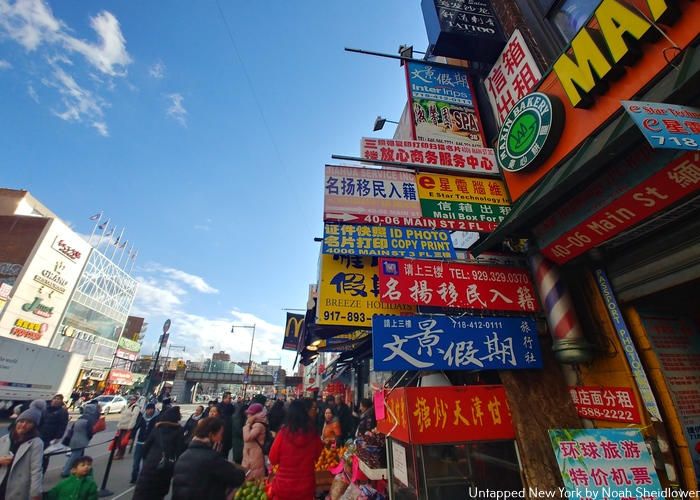
Flushing rivals Manhattan’s and Sunset Park’s Chinatowns as New York’s center of Chinese culture; 71% of Flushing’s population is Asian, the majority of which consists of Chinese residents. With such a diverse Asian population, Flushing has become a food paradise, housing eateries from nearly every region in China as well as from countries like South Korea, Japan, and Malaysia.
For a quick yet delicious meal, Zhu Ji Dumpling Stall offers juicy and fresh pork and leek dumplings, fluffy pork buns, rice noodles, and deep-fried cruller. Tucked away in a shopping plaza, Best North Dumpling Shop serves a similar menu of dumplings like beef with turnip and pork with fennel as well as a variety of pork buns. For some of the cheapest dumplings in Flushing, Jie Jie Sheng offers typical fried dumplings and buns in addition to leek pancake and oxtail noodle soup. Also try the Peking Duck Sandwich Stall within Corner 28 market, which serves peking duck in a fluffy bao.
Many of Flushing’s best eateries are housed within its many shopping malls, the largest of which being New World Mall. Housed within the mall are popular options like Lan Zhou Noodles, cuisine from China’s Gansu Province; Old Luoyang, specializing in Henan cuisine; Fish Dumpling, and Yoz Shanghai. Flushing’s second-largest food court, New York Food Court, includes favorites like Incredibowl, a make-your-own dry hotpot stall, Western Spicy Chicken, and Siblings Potato Noodle. The relatively new Super HK Food Court offers a similar array of Chinese stalls from many regions of China.
For dim sum, the most popular and traditional places include Asian Jewels Seafood Restaurant, Royal Queen, and Shanghai You Garden, which all serve classics like siu mai, shrimp dumplings, and buns. Other places to try that specialize in dim sum include 39 Kings Cafe, which offers favorites like tripe and turnip cakes, and Yi Feng Yuan, which offers pumpkin cake and fermented glutinous rice dumplings.
Flushing also offers a selection of central Chinese eateries like Lucky Chen, a rather formal eatery with a selection of Hunanese chicken, pork, and fish dishes. 200 Gram Noodles, a rather modern spot, offers a selection of dishes from Chongqing like pork liver and kidney with pickled vegetables and Gele Mountain spicy chicken. Hot Space, a Sichuan eatery, offers various spicy dishes like buffalo fish and bullfrog that can be shared between two or three people.
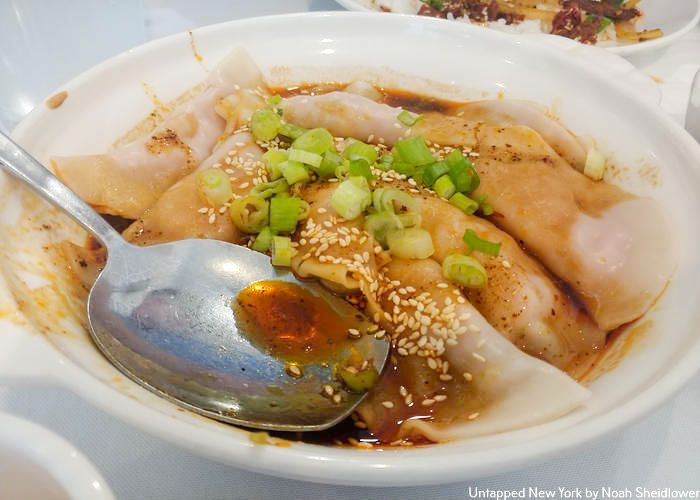
North of Flushing is College Point, a rather non-touristy Queens area with a developing Chinatown centered around College Point Boulevard. In addition to housing many Chinese eateries, College Point is also the location for Chinese newspaper World Journal‘s headquarters.
Little Pepper is a staple of College Point serving Sichuan fare like sliced fish in a spicy soup, griddle cooked shrimp, and Sichuan double cooked pork. Just up the road is Long King House, a Shanghainese eatery with a selection of dim sum, skewers, and seafood options. Also on College Point Boulevard is 8090 Taiwanese Food, which offers a small menu of Taiwanese dishes like salt and pepper squid on rice and Taiwanese dry noodle in addition to teas and slushes.
A bit further east is a building that houses three Chinese eateries: on the second floor is Pinshang Hot Pot, which offers 10 soup bases and a selection of meats and vegetables; on the third floor is Fish Village, a Hong Kong-style eatery with a selection of seafood options like sea cucumber, lancelet, and turtle; and on the fourth floor is The Buffet, which serves Chinese classics buffet-style in addition to Pan-Asian and American-style options.
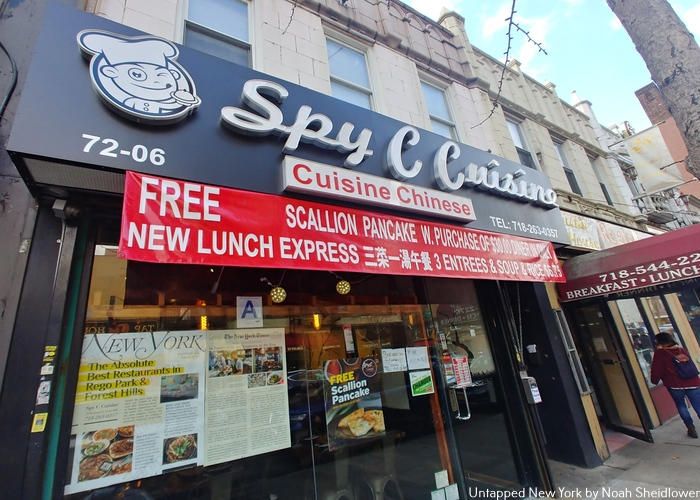
Forest Hills has become one of Queens’ mini Chinatowns due to increased Chinese immigration and cheaper rent prices than nearby Flushing. Although the area is very culturally mixed, Austin Street and Queens Boulevard have quickly become epicenters of Chinese culture. The neighborhood, with a 30% Asian population, is a must-try for both Northern and Southern Chinese cuisine.
For a taste of Beijing street food, Beijing Dumpling specializes in juicy pork and chive dumplings and fluffy fried pork buns in addition to beef hand-pulled noodle soup. Due to the area’s diversity, Beijing Dumpling also offers Japanese-style dishes like chicken teriyaki. Spy C Cuisine, which also offers some Shanghainese dishes, specializes in Beijing-style fare like pork belly and potato dry pot style, braised fish with mustard greens, and cumin lamb.
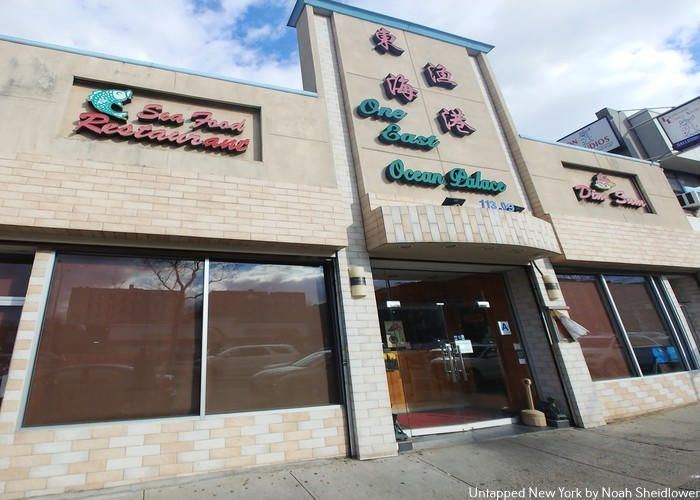
Food from China’s northwest is featured at Xin Taste Hand Pull Noodle, which specializes in Lanzhou cuisine. The small eatery offers both thin hand-pulled noodles and thick hand-peeled noodles prepared with proteins like duck and eel.
Memories of Shanghai, a tiny, hidden-away eatery, offers classics like xiaolongbao and sticky rice ShaoMai as well as thick pan-fried noodles and dim sum options like radish cake. Dim sum also features prominently on the menu of East Ocean Palace, a spacious dim sum eatery offering classic Cantonese options like roast pork buns, turnip cake, and shrimp rice rolls.
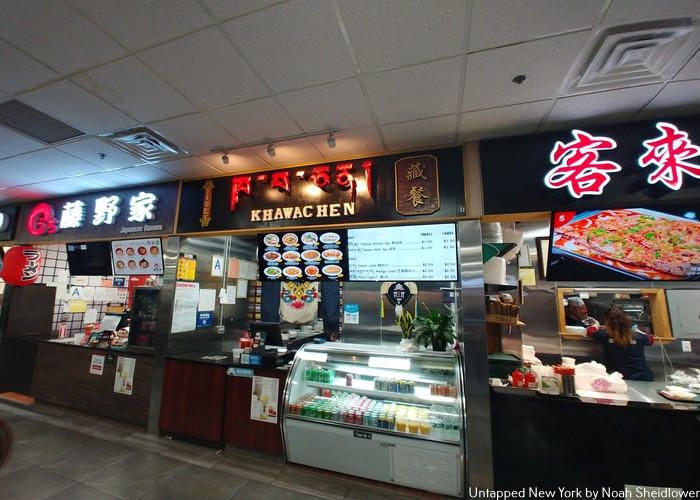
Elmhurst is one of New York’s most diverse neighborhoods, housing one of Queens’ Chinatowns, a Little Thailand, and even a Little Tibet. The second largest Chinese enclave in Queens behind Flushing, Elmhurst offers a mix of Northern and Southern Chinese fare in a bustling environment.
In addition to featuring many Thai stalls, Elmhurst’s Hong Kong Food Court features a diverse selection of options like Lan Zhou Ramen, which serves Lanzhou noodle soups and BBQ skewers; LaoMa Spicy, which offers a customizable stir-fry pot; and Chili Boiled Fish, which prepares all sorts of seafood like crayfish, sea whelks, and crab.
Also included in the food court is Khawachen, a Tibetan stall that makes incredibly juicy momos as well as thenthuk, hand-pulled noodles in a light broth. Lhasa Liang Fen, a tiny but cozy Tibetan restaurant nearby, serves paoze, steamed buns, and its namesake dish liang fen, a cold noodle dish with minced meat.
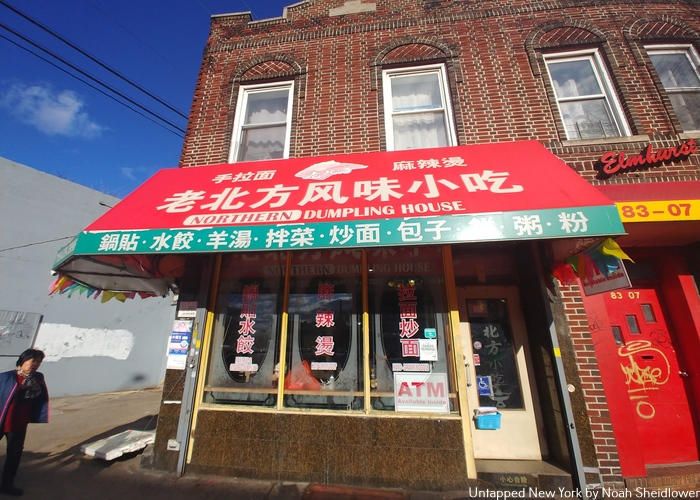
Lao Bei Fang Dumpling House serves many styles of hand-pulled noodle soup from fish ball to tripe to braised pork chop. Also known for their noodles is Wong Kwong Hop, which specializes in Cantonese rice rolls consisting of long thin noodles with choice of filling like pork or chicken.
Popular Cantonese options include Shun Wang, an Elmhurst staple that serves classics like roast duck and roast pork barbecue as well as rice rolls. High Pearl near the food court serves traditional Cantonese fare like winter melon soup, steamed lobster, and salty beef casserole.
Prominent in Elmhurst are dollar stores that sell all sorts of appliances and household items for very cheap prices. Hectic supermarkets like US Supermarket sell very fresh Chinese produce as well as seafood and Chinese snacks.
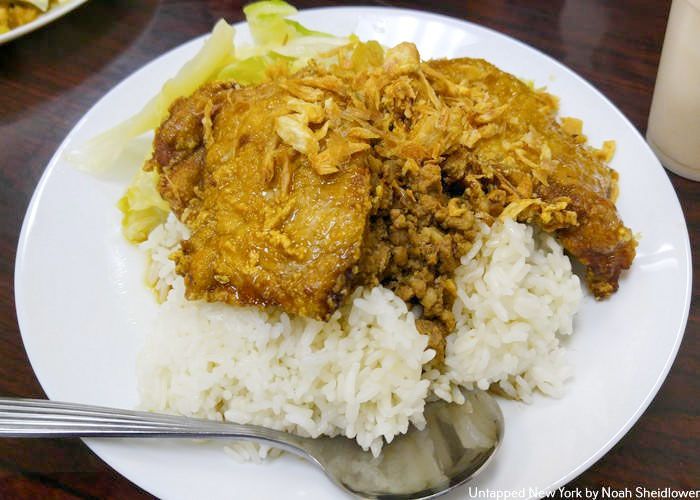
These three neighboring areas have seen a significant rise in Chinese population over the past few years, with 43% of the population consisting of Asian residents. Located near Northern Boulevard, many Chinese restaurants and stores from different regions of China have attracted praise from both the local community and tourists.
Little Neck, one of Queens’ up-and-coming Chinatowns, is home to Cantonese restaurants like Moo Shu Duck, a tiny hole-in-the-wall eatery notable for its Peking duck, noodle soup with thin egg noodles, and fried flounder. LN1380, one of Little Neck’s newest eateries, serves modern Cantonese fare like dim sum, conch with oyster mushroom, and soy sauce chicken, while nearby Northern Manor offers more traditional fare like steamed scallop and frogs legs. Shanghainese cuisine is also popular in Little Neck, with favorite Little Dumpling offering classics like crab soup dumplings, stir-fried eggplant, and Lion’s Head meatballs.
Bayside also has a thriving Chinese community with newcomer You Garden Xiao Long Bao offering innovative Shanghainese dishes like a giant soup dumpling, stir-fried eel, and sweet and sour shrimp casserole. Also popular is Mama Lee, a hidden Taiwanese eatery known for classics like salt and pepper chicken, minced pork with tea egg, and Hakkanese pork with bean curd. Bayside also houses multiple Korean-Chinese restaurants like Guh Song, which offers a menu combining Chinese and Korean classics.
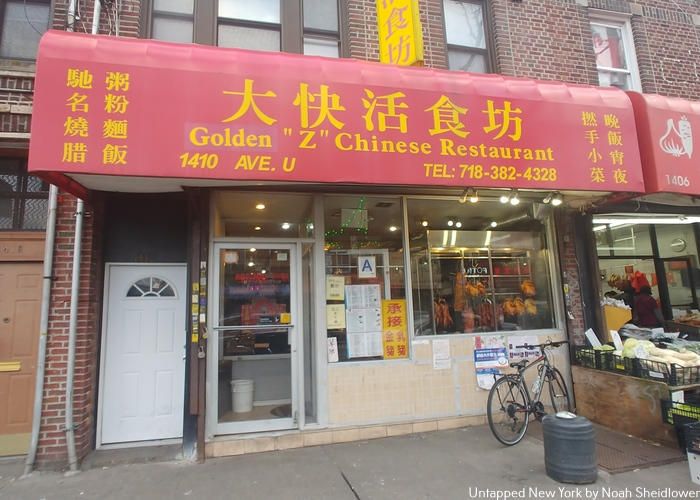
Concentrated along Avenue U in the Homecrest area of Brooklyn is one of Brooklyn’s largest Chinese enclaves and Chinatowns. Situated right next to the predominantly Russian and Central Asian area of Sheepshead Bay, Homecrest is home to a vibrant, growing Chinese community.
Golden Z restaurant specializes in Cantonese cuisine with very traditional dishes like roast pork over rice, razor clams with black bean sauce, and congee. Also serving classic Cantonese cooking is Wing Hing Seafood Restaurant, offering diners with a selection of chef’s special seafood, poultry, and meat dishes as well as an array of dim sum and Cantonese noodles. Season Restaurant offers similar dishes to the aforementioned eateries but also presents some more creative dishes like veal chop, taro duck, and curry beef.
Bakeries are also rather prominent on Avenue U. In addition to serving egg tarts and fluffy breads, Ka Ka Bakery offers a very cheap hot food section consisting of chow fun, thin rice noodles, and braised pork. Good Family Bakery offers dim sum options like steamed rice rolls, har gow dumplings, and chicken feet, as well as hot and cold drinks.
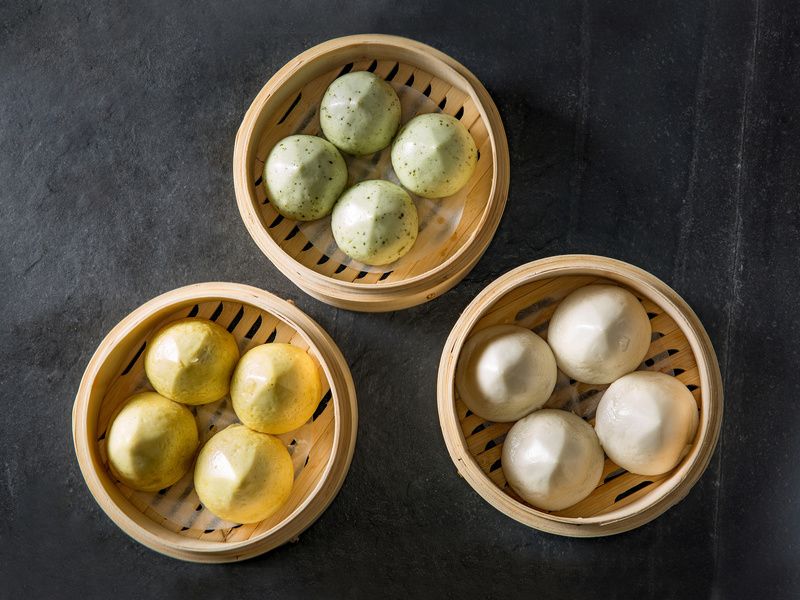
With one of the largest Chinatowns in New York, Sunset Park, Brooklyn, is often seen as the least touristy of New York’s three main Chinatowns; with an Asian population of over 44,000, Sunset Park has quickly grown into a solidified and united Chinatown. Yet Sunset Park has some of the best and most creative restaurants in all of the city, featuring cuisines from regions of China rarely seen in New York.
Known for its simple menu, minimal decor, and fantastic food, Kai Feng Fu offers a variety of dumplings like pork and leek, chicken and mushroom, and vegetable, as well as fluffy pork buns and a selection of noodle soups made with thick udon-style noodles. The unassuming Hong Kong Dim Sum offers a selection of rice rolls as well as congees for a quick breakfast. For a taste of Fuzhou, hole-in-the-wall Wei Mei Xian specializes in gigantic steamed pork buns filled with a delectable BBQ pork filling. Also serving street food-style Fuzhounese cuisine, Wan Zhong Wang serves pork dumplings that have a translucent skin as well as peanut butter noodles and fish ball soup.
Although most Sunset Park Chinese eateries are individual storefronts along 7th and 8th Avenues, there is one major food court in Fei Long Supermarket housing about ten stalls. Guang Fu Inc. serves a rather large menu with favorites like soup dumplings, bean paste noodles, and Shanghai chow mein. Yummy Chummy Inc. right next door specializes in roast pork and roast duck as well as rice rolls and Hong Kong-style beef brisket noodles.
Sunset Park has a number of Yunnanese restaurants specializing in cuisine from China’s west. Yun Nan Flavor Garden, a popular Yunnanese eatery, prides itself on its Crossing the Bridge rice noodles with chicken, vegetables, and quail egg. Also popular is Western Yunnan Crossing Bridge Noodle, which serves over ten varieties of its namesake dish as well as side dishes like duck neck and Hmong style beef.
Popular for Cantonese food is Rich Village Restaurant, with a selection of seafood dishes like steamed crab, taro and clam casserole, and flounder. For dim sum, eateries like the extremely popular East Harbor Seafood Palace, Golden Imperial Palace, and Open Rice serve a variety of classic dim sum delicacies.
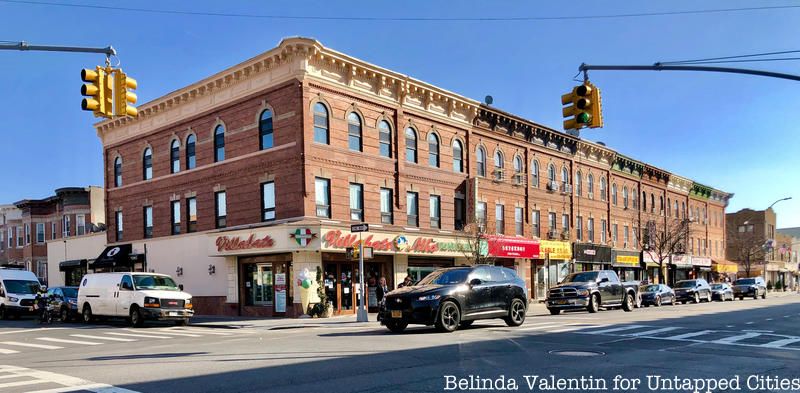
Bensonhurst in Brooklyn, one of the borough’s three main Chinatowns, has seen a massive rise in Chinese immigration over the past two decades, with Bensonhurst housing nearly 32,000 Chinese residents as of 2015, the largest Chinese population of any NYC neighborhood. Bensonhurst’s Chinatown has been nicknamed Little Hong Kong and Little Guangdong due to the area’s high Cantonese-speaking population.
Mama’s Noodle House, a miniscule eatery with only one table, features a large selection of Cantonese-style noodle soups like beef stew noodle soup and curry fish ball noodle soup, as well as a selection of Szechuan hot pot dishes. Duck Wong serves a similar style of noodle soup with very thin noodles and a selection of proteins, as well as rather atypical dumplings like kale sausage dumplings and century egg with pork dumplings. The nearby E Dim Sum offers a small selection of dim sum like zongzi (glutinous rice wrapped in bamboo leaves), homestyle stewed duck, and salt fish with preserved meat. For a traditional dim sum experience with carts strolling through the restaurant, Golden Bay offers classic options as well as specialty dishes like braised goose and oxtail.
Additionally, Bensonhurst houses a handful of Shanghainese eateries like Liu’s Shanghai, which features Shanghainese classics like pork with preserved vegetables, fish head casserole, and tofu with crab meat. Mr. Bun, a much more modern eatery than Liu’s, offers specialties like three cup chicken and pork with cuttlefish as well as fried rice cake and crispy noodles.
In addition to many other Cantonese restaurants and even some Sichuan restaurants like Szechuan Garden, Bensonhurst features restaurants serving popular street foods from across China like Hand Pull Noodle and Dumpling House, popular for its scallion pancake rolls with beef and simple tripe noodle soup, and Jiangnan Pancake, specializing in jianbing (Chinese crepe with protein and oftentimes pork floss) and liang pi (cold spicy noodles).
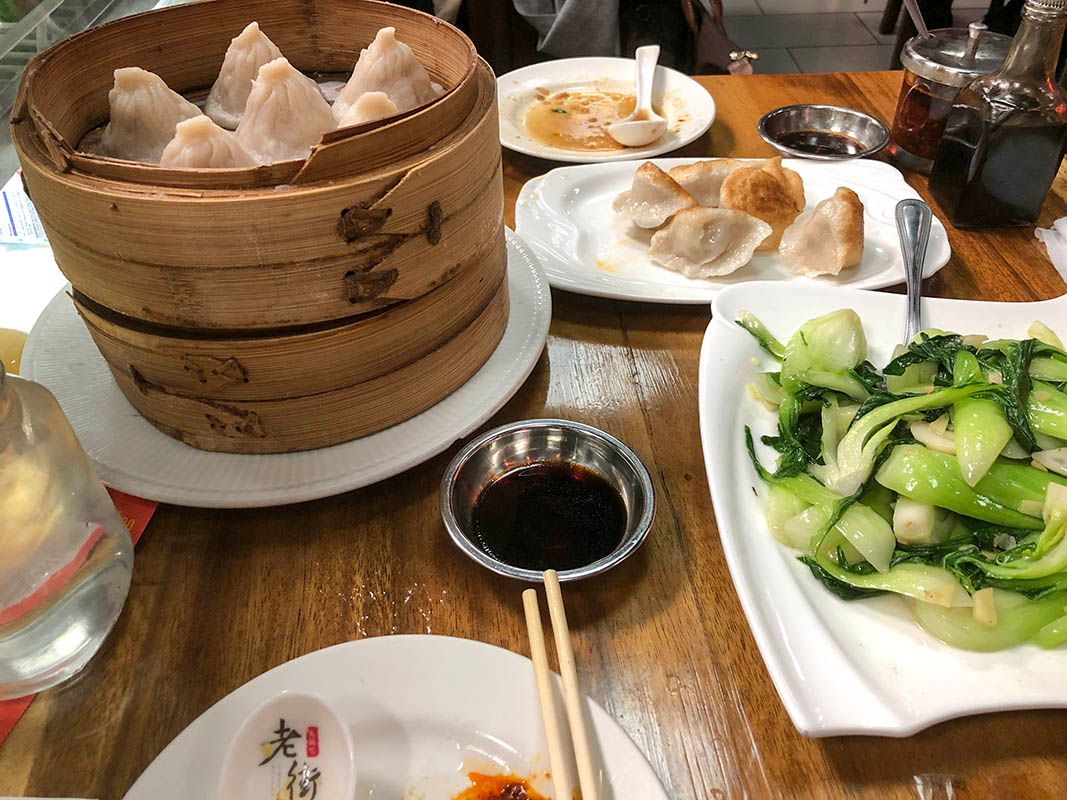
Suffolk County has one of its own developing Chinatowns around Stony Brook and nearby Centereach, with over ten eateries specializing in cuisines from across China. Situated right near Stony Brook University, students, locals, and foodies alike travel to the Stony Brook area for some of Long Island‘s best Chinese fare.
A staple of Stony Brook’s food scene, China Station offers relatively cheap noodle soups with options like lamb and beef tendon, a variety of dumplings with more creative options like kimchi dumplings, and rice and noodle dishes. With a similar menu and atmosphere, 1089 Noodle House offers a selection of Shanghainese noodle soups prepared with five types of noodles, chef’s suggestions like big plate chicken and spicy dry pot, and American-Chinese classics. Noodles are also the star at Splendid Noodle, which serves Lanzhou-style noodle soups with varieties like oxtail, clam, and duck, as well as starters like jellyfish salad and pig ear.
For high-quality dim sum, Red Tiger Dumpling House offers a selection of Shanghainese delicacies like soup dumplings, crystal shrimp dumplings, and peach buns with lotus, in addition to spicy Beijing-style chef specials like beef with bitter gourd and hot pot beef. Adding to the spice is Jianghu Restaurant, which specializes in Sichuan cuisine with dishes like flounder in chili sauce, braised fish with pickled mustard, and chestnut braised pork. Also popular for Sichuan cuisine is Spice Workshop, with five types of dry pot, Chengdu-style noodles, and an array of fish prepared in extremely spicy sauces.
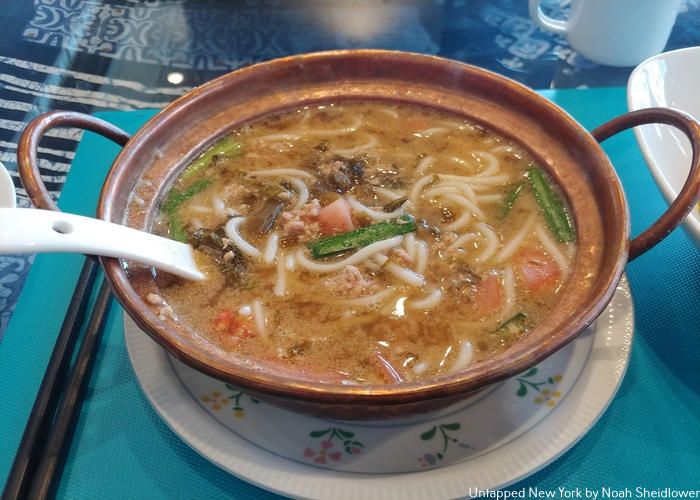
Scattered throughout Nassau County are a handful of authentic and delicious Chinese eateries that parallel the quality of places in Flushing and Sunset Park. As more and more Chinese families are settling in Nassau County, particularly the North Shore and central Nassau, the restaurant scene is slowly becoming more and more Asian-focused, with an abundance of Chinese restaurants from many different regions of China.
Although not commonly thought of as one of the region’s Chinatowns, Great Neck near the Queens border includes a line-up of authentic Chinese restaurants. Northern Chinese restaurant New Fu Run offers an expansive menu of everything from green bean sheet jelly to fried blue crab to ribbon fish in brown sauce. Newly-opened Sichuan restaurant Kitchen Melody offers a delicious selection of spicy beef and pork dishes like pork belly in chili sauce and pork kidney.
In nearby New Hyde Park, Chef Wang serves up Sichuan delicacies with cumin lamb, Chongqing diced chicken, and Chengdu spicy fish, as well as more American-style options and sushi. In Glen Cove, recently-opened Zouji Dumpling House offers diners like Northeast Chinese options like crispy pork with ginger, twice-cooked pork, and pork with sour cabbage dumplings. Shanghainese food features prominently on the menu of Blue Wave in Williston Park, which serves traditional Shanghainese entrees like fish head with crystal noodles, Shanghai meatballs with egg yolk, and crispy duck.
Next, check out these 18 ethnic micro neighborhoods of the five boroughs!
Subscribe to our newsletter